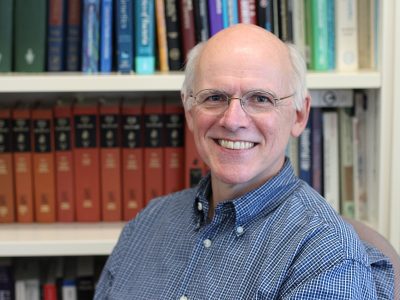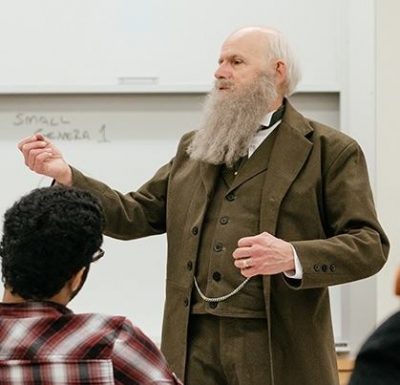Kenneth Noll’s career at UConn began in 1990.  He received his doctoral degree working with Ralph Wolfe at the University of Illinois where he identified the elusive “component B” in methanogenesis as 7-mercaptoheptanoylthreonine phosphate. Component B is essential to the last step in making biogenic methane. Its characterization was a major advance in understanding the global carbon cycle. He did his postdoctoral work with Carl Woese, the inventor of 16S rRNA phylogenetics, at the University of Illinois, mapping the genomes of archaea using rare-cutting restriction enzymes. At UConn, Noll’s research and teaching interests encompassed microbial physiology and molecular evolution, especially of extremely thermophilic prokaryotes in the Thermotoga and Archaea; genome organization and horizontal gene transfer in the evolution of prokaryotes; evolution of microbial metabolic pathways; biological hydrogen generation; microbial fuel cells; and biofuels. He led the sequencing of 11 genomes from thermophilic bacteria back when sequencing genomes was less convenient than today. Noll’s research accomplishments are recorded in over 100 reviewed papers, articles, and book chapters. He was responsible in whole or collaboratively for bringing over $10.8 million in research funding to UConn for a variety of research projects on thermophiles, termite gut microbiology, biological sensors, and horizontal gene transfer. His reputation as a tough but fair editor led to his service on several editorial boards and grant review panels and as an ad hoc reviewer for many federal funding agencies and journals.
He received his doctoral degree working with Ralph Wolfe at the University of Illinois where he identified the elusive “component B” in methanogenesis as 7-mercaptoheptanoylthreonine phosphate. Component B is essential to the last step in making biogenic methane. Its characterization was a major advance in understanding the global carbon cycle. He did his postdoctoral work with Carl Woese, the inventor of 16S rRNA phylogenetics, at the University of Illinois, mapping the genomes of archaea using rare-cutting restriction enzymes. At UConn, Noll’s research and teaching interests encompassed microbial physiology and molecular evolution, especially of extremely thermophilic prokaryotes in the Thermotoga and Archaea; genome organization and horizontal gene transfer in the evolution of prokaryotes; evolution of microbial metabolic pathways; biological hydrogen generation; microbial fuel cells; and biofuels. He led the sequencing of 11 genomes from thermophilic bacteria back when sequencing genomes was less convenient than today. Noll’s research accomplishments are recorded in over 100 reviewed papers, articles, and book chapters. He was responsible in whole or collaboratively for bringing over $10.8 million in research funding to UConn for a variety of research projects on thermophiles, termite gut microbiology, biological sensors, and horizontal gene transfer. His reputation as a tough but fair editor led to his service on several editorial boards and grant review panels and as an ad hoc reviewer for many federal funding agencies and journals.
Noll spent several years as Associate Department Head for Undergraduate Education and Research, a difficult role in a highly complex department. Professor Emeritus David Benson notes that “Dr. Noll’s career exemplifies what being a Professor is all about – intellectual curiosity, training a new generation, expansive interests, service, and public engagement. Aside from running a fascinating research program on hyperthermophilic bacteria funded by NSF, NASA and DOE, he also served as Associate Department Head. His fairness and clarity were critical for helping our graduate and undergraduate educational programs adapt and even thrive amid budget rescissions and administrative pressures."
Noll believes in the importance of science communication and is himself a gifted communicator. He served as editor, writer, and designer of MCB’s annual publication, MCB Notes, and Expression for 12 years. In addition, he created two graduate professional communications courses: “Communication Skills: Building your Research Story” and “Communication Skills: Improvisation to Improve Listening.” He also gave many graduate student professional development training presentations about public speaking. Nationally, he organized and hosted the wildly successful ASM Kadner Institute career workshops at UConn for three years, and served for six years on the ASM Committee on Graduate and Postdoctoral Education. He practiced his skill at public speaking at presentations on campus, and to community groups on topics ranging from thermophiles to Charles Darwin, natural selection, life in the deep sea, termite guts, and even the Higgs boson. He was able to translate complex scientific issues into everyday language that could be understood by the general public. Consequently, he participated in science fairs for high schools, BioBlitz events enumerating microbial diversity in the field, taught middle school children about microorganisms in his summer course called “Magnificent Microbes” as part of the “Kids Are Scientists and Engineers, Too” program; did radio interviews about microorganisms; spoke to retirees at the Center for Learning in Retirement (CLIR); and held forth in interviews on local radio stations and podcasts.
 He is also quite the performer. Using his theatrical skills, he melded science with the personality of Charles Darwin, and performed, in character, to schools, museums, and at public events, so audiences could understand the historical context of when Darwin lived. He created a website, Charles Darwin: A Life in Stories which he has dedicated to bringing Mr. Darwin to life. Noll’s fascination with history garnered international recognition for UConn as one of 17 “Milestones in Microbiology” historical sites when he unearthed the seminal work of Herbert William Conn, who practiced the then-new discipline of microbiology at the end of the 19th century, and was the co-founder of the ASM and Professor at the Storrs Agricultural College. Through these activities, Noll has become a well-known ambassador for MCB and all things microbiology.
He is also quite the performer. Using his theatrical skills, he melded science with the personality of Charles Darwin, and performed, in character, to schools, museums, and at public events, so audiences could understand the historical context of when Darwin lived. He created a website, Charles Darwin: A Life in Stories which he has dedicated to bringing Mr. Darwin to life. Noll’s fascination with history garnered international recognition for UConn as one of 17 “Milestones in Microbiology” historical sites when he unearthed the seminal work of Herbert William Conn, who practiced the then-new discipline of microbiology at the end of the 19th century, and was the co-founder of the ASM and Professor at the Storrs Agricultural College. Through these activities, Noll has become a well-known ambassador for MCB and all things microbiology.
Dr. Noll has a passion for sharing his excitement for science with children. For several years he ran a summer program for middle school children in which they explored microbes in ponds, the woods, and kitchens. He created a website, ‘Microbes and More’ that has pages with resources for teachers where they can find out about his work teaching microbes to children, exploring Mark Twain’s use of microbes in one of his stories, the fascinating world of microbes in termites’ guts and self-made flip books for children to learn about extremophiles. In recognition of these manifold activities, Professor Noll received the Provost’s Award for Excellence in Public Engagement in 1997.
According to Michael Lynes, current head of MCB, “Dr. Noll was a passionate scientist, communicator, and colleague. His energy was always focused in a way that benefitted those around him, and his love of a good story led him to represent the MCB community in novel and effective ways. He was particularly active in leading the recognition of MCB and the UCONN scientific community for some of the early microbiology research that was done on campus.”
Now that he has retired from a well-rounded career, Noll plans to continue sharing his love of science through his websites and public appearances.
Dr. Noll has been appointed by the UConn Board of Trustees as Professor Emeritus, Molecular and Cell Biology.